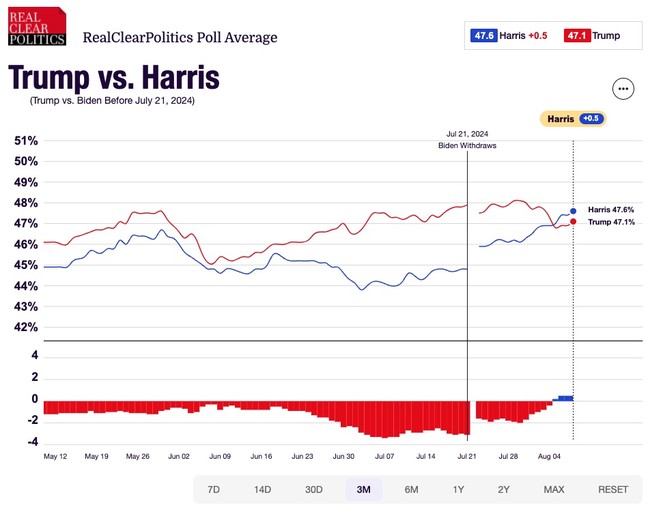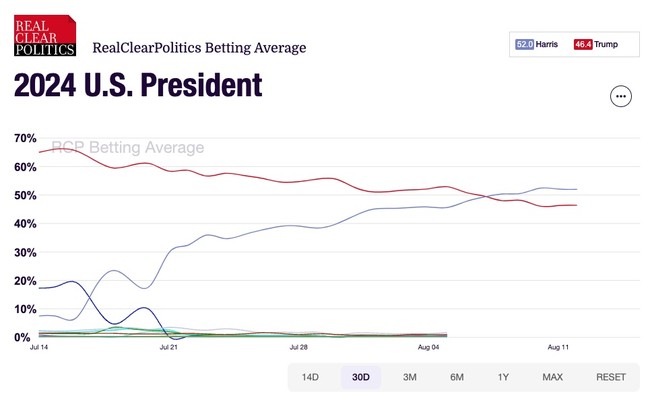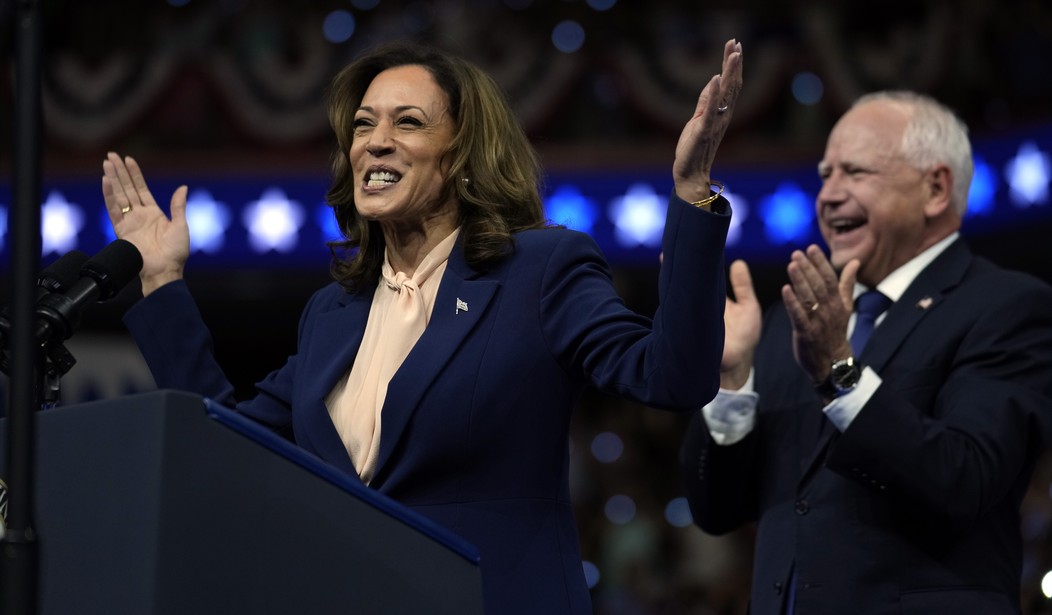Have the polls gone to the moon, Alice? Not quite. Data from the past two weeks show a honeymoon for the new Democrat ticket is real, but not spectacular. Yet, anyway.
Let's start with some trenchant observations from our friend Jim Geraghty at NRO. The sudden change at the top of a ticket and the end of a rematch most voters didn't want has breathed new life into Democrat fortunes. This comes to us from our VIP member RChapman, who posted an excerpt from it on an earlier thread:
In his press conference Thursday, Trump claimed, “I’m leading by a lot.” He really isn’t, judging from all available public polling.
In national polling, head to head, Harris is narrowly ahead, 47.6 percent to 47.1 percent in the RealClearPolitics average without the minor-party candidates included. With the minor-party candidates included, Harris leads, 45.3 percent to 44.5 percent.
In the RealClearPolitics polling average in Michigan, Harris leads by 2.8 percentage points over Trump. In Wisconsin, Harris leads by eight-tenths of a percentage point. In Pennsylvania, Trump leads by eight-tenths of a percentage point.
It's been a while since we've looked at the polling, mainly because there hasn't been much new since Kamala Harris picked Tim Walz as running mate on August 5th. RCP's national polling aggregation has only one poll that includes any time in its survey since that change, a Rasmussen poll that has Trump up 5. But in the week prior to that selection, polls had already begun to shift toward Harris, as this chart demonstrates:
 The polls didn't do much in the first week of Harris' anointed nomination, in part because Harris herself didn't do much. They began to move in her direction when the Trump campaign went on the attack for her identity, especially when Trump himself did so at the National Association of Black Journalists convention. Whether that caused this change or the data is only correlative is debatable, but the result is clear -- Harris picked up momentum, and Trump dropped back to his pre-debate, pre-assassination attempt level in the RCP tracking.
The polls didn't do much in the first week of Harris' anointed nomination, in part because Harris herself didn't do much. They began to move in her direction when the Trump campaign went on the attack for her identity, especially when Trump himself did so at the National Association of Black Journalists convention. Whether that caused this change or the data is only correlative is debatable, but the result is clear -- Harris picked up momentum, and Trump dropped back to his pre-debate, pre-assassination attempt level in the RCP tracking.
At least thus far, the polling changes look marginal. The changes in the betting markets look much more substantial, which RCP also tracks. Trump has led these since late May, and Democrats' chances absolutely cratered after the debate and the assassination attempt. However, they have rebounded bigly, so to speak, since Joe Biden withdrew. The chart below shows the track over the last 30 days, but there's more worrisome context to this:
 This shows only a narrow lead for Harris in the betting markets, which I believe is more current than the polling aggregation. However, this is the first time in the cycle that the odds for a Democrat win have gone above 50%; the highest level for Biden was 43.4% in late April. This shows that people with skin in the game -- or at least real cash money -- see this as an entirely different race, and perhaps that they fear that the Trump campaign has not caught up to that new reality.
This shows only a narrow lead for Harris in the betting markets, which I believe is more current than the polling aggregation. However, this is the first time in the cycle that the odds for a Democrat win have gone above 50%; the highest level for Biden was 43.4% in late April. This shows that people with skin in the game -- or at least real cash money -- see this as an entirely different race, and perhaps that they fear that the Trump campaign has not caught up to that new reality.
More on that in a moment. First, let's look at the battleground states, where again the shifts have not been as dramatic. We'll start with the Blue Wall, which does look a bit bluer than a month ago:
- Wisconsin: Harris +0.8
- Michigan: Harris +2.4
- Pennsylvania: Trump +0.8
It's worth noting that all three states have only had two polls since Walz came aboard the Democrat ticket, so the data is still somewhat thin. In all three, Trump hasn't lost ground so much as Harris has gained it, at the expense of the "third party" candidates in the race. Her anointing as the Democrat nominee appears to have attracted support from the No Rematch voters on first blush. At least thus far, though, only Wisconsin has shifted out of the Trump column, and only as barely as Wisconsin was in it in the first place.
Let's take a look at the rest of RCP's battleground states:
- Arizona: Trump +1.5 (one poll since 8/5)
- Nevada: Trump +3.7 (one poll since 8/5)
- North Carolina: Trump +3.2 (two polls since 8/5)
- Georgia: Trump +0.6 (no polls in August)
The data is still pretty thin here as far as Walz' impact can be measured in battleground states. However, Harris' impact certainly got measured by these aggregations, and it looks as though its effect has been less pronounced than in national polling. So far.
Why "so far"? It does seem that the Biden-Harris switcheroo caught the Trump team a bit flat-footed. Trump and the campaign has struggled to figure out an effective message against Harris, especially in the face of a massive Protection Racket Media narrative that has vaulted Harris from an incompetent word-salad VP to a Grrl Power icon, and her incessant and bizarre giggling as Joy Incarnate. The obvious target of attack for Harris is on policy, and yet the campaign shot itself in the foot with attacks on her ethnic identity in the opening salvos, including by Trump in his appearance at the National Association of Black Journalists.
Or to put it another way: Calling her a DEI hire might be accurate but it's not going to speak to anyone whose vote is still up for grabs. Reminding everyone that Harris wanted to eliminate border enforcement by defunding ICE, demanded an end to fracking, and pushed to defund the police in 2019 and 2020 speaks to the issues that actually matter to voters and impacts their lives. The same is true about Tim Walz' "stolen valor" and record embellishments regarding his National Guard service, which will matter for a brief moment and then fade. Of much more significance is Walz' hard-Left track record as governor in Minnesota, especially during the Minneapolis riots and Walz' fascist policies during the pandemic.
Jim also hits on the lack of discipline in the first days of a brand-new campaign:
Trump could run a much better, much more persuasive, and much more effective campaign with much better chances of victory if he wanted to do so.
He just isn’t willing to put in the work.
By the way, you know who is out there, doing the work? J. D. Vance — who did interviews on ABC’s This Week, CBS News’ Face the Nation, and CNN’s State of the Union yesterday.
Actually, this shows that the Trump-Vance may have learned from the missteps. Vance has been sharply focused on issues on these shows. Trump also appears to have adjusted in that direction since the presser last week, although Trump will always be somewhat undisciplined in his extemporaneous, stream-of-consciousness style. In his social-media engagements the last couple of days, Trump has stuck closer to the issues rather than the personalities.
Finally, we should have been prepared to see this kind of a honeymoon burst for Harris. Having Biden exit the race gave her candidacy a certain novelty, as well as breaking the rematch model that many voters dreaded. Just the change alone would have generated more enthusiasm for the election, and that may still be all that this is. We can expect more of that novelty-based enthusiasm to emerge before and during the convention as well -- and if the DNC can put a lid on dissent, perhaps after it as well. At that point, though, the novelty will likely wear off, and so will the "vibes" of a substance-free campaign.
In short, expect to see a little more upward trajectory for Harris, especially if the media keeps being complicit in her silence. The next potential for a reset in this race will be in the presidential debates, but it will also depend just how disciplined Trump and Vance can be in forcing scrutiny of Harris' positions and the Biden-Harris track record.







Join the conversation as a VIP Member